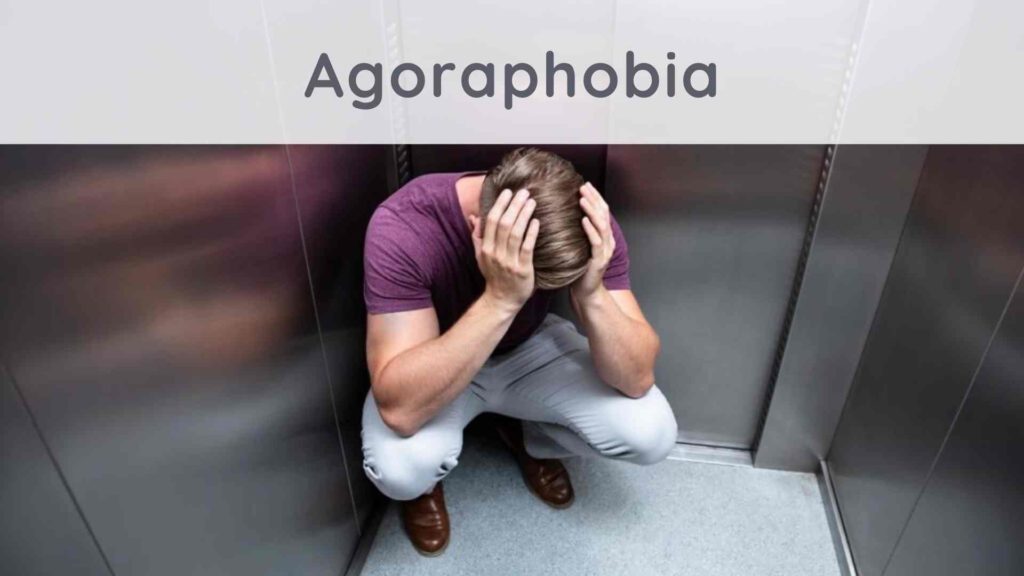Agoraphobia: are there solutions to help?
Written by: Loris Vitry (holistic coach)
Validated by: Cathy Maillot (Osteopath)
Caution: If you have any medical questions or concerns, please speak to your doctor. Even if the articles on this site are based on scientific studies, they do not replace professional medical advice, diagnosis or treatment.

In men’s lives, we often talk about community, society, relationships.
But some people find it extremely difficult to appear in public with others, and this behavioral trouble is called agoraphobia.
It’s not a disease; it’s an unreasonable fear of public spaces and crowds.
The individual suffering from agoraphobia tends to remain cloistered at home.
When he gets out, he is overcome by intense anxieties that overwhelm him and prevent him from being comfortable.
Since agoraphobia is not a disease in any way, it cannot be treated with medication.
Discover in this article, what you need to know to heal?
Agoraphobia: what to know about this phobia?
Before looking at the solutions, let’s first focus on the characteristics of this phobia.
A phobia based on fear of places
Agoraphobia consists of fear of places, and these experiences come with enormous difficulties.
An agoraphobic feels often trapped and tells himself that he cannot escape and cannot be rescued from an “unsafe” place.
In short, this phobia is based on the fear of not being able to be safe in the public space and surrounded by the crowd.
Generally, over a lifetime, the prevalence of agoraphobia can affect 7% of the general population.
This phobia affects more women than men (2 women for a man).
The causes of agoraphobia
The leading cause of agoraphobia is the disruption of the reptilian brain, which is a consequence of very advanced chronic stress and anxiety.
So it doesn’t happen by chance.
The body and mind of the individual are suffering from a Spatio-temporal imbalance.
This imbalance leads to living day by day in this state of intense chronic stress and generalized anxiety.
The stress then triggers irrational fears in public places in particular.
Various phobogenic situations can accentuate this fear.
The different phobogenic situations
An agoraphobic fears several phobogenic situations, and it’s mainly the case for being in public spaces or places such as stadiums, shopping centers, parks, restaurants, public transport, among others.
The individual is also afraid of closed spaces such as elevators, cars, planes, tunnels, or cinemas.
There can be a variety of phobogenic situations for the individual suffering from agoraphobia.
The different symptoms linked to agoraphobia
Symptoms related to agoraphobia can be many.
A person with agoraphobia can have a dramatic attack, which can be similar to a heart attack.
For many, this is quite a terrifying moment.
So generally, the individual is sweating, feeling palpitations, shortness of breath.
He thinks he is not safe and that he is in great danger.
He feels like he’s going to pass out, or worse, he’s going to die.
The fear is increased by the sensations it triggers, and as a chain reaction, it leads to panic attacks.
The consequences of agoraphobia
The consequences of agoraphobia can be disastrous as it impacts his everyday life severely.
The individual affected by agoraphobia tends to isolate himself from community life.
If he succeeds in getting a job, he has enormous problems devoting himself to his various responsibilities.
Also, he finds it challenging to have a good couple’s life.
Moreover, he is always under stress often without reason.
How to recover from agoraphobia?
As a reminder, agoraphobia is not a disease and cannot be cured with medication.
There are, therefore, many attitudes to adopt:
Know the agoraphobia well
To get rid of agoraphobia, you need to know the real causes of agoraphobia, to locate them, to counter them better.
Is this fear due to a state of chronic stress?
Is it linked to a painful circumstance that happened in your life?
You need to highlight the trigger for this fear.
Thus, you can commit to some of the most effective solutions possible to recover from agoraphobia.
Be aware of this phobia
To heal from agoraphobia, you need to be aware that you are suffering from it.
You will need to be aware of the symptoms that are linked to this behavioral disorder.
Crises will undoubtedly happen.
You will have trouble breathing; you will feel palpitations.
You first need to learn to live with these symptoms.
Then you will restore balance in your body and mind gradually.
But above all, you need to reduce stress.
Manage and reduce stress
Since agoraphobia is mostly linked to stress, you need to learn how to feel less stressed when you go to a public place.
It will be a step-by-step work.
It will have to expose yourself to situations gradually to allow your brain to get used to it.
The longer the exposure time, the more your anxiety level will decrease considerably.
Seek professional help
Sometimes it can be challenging to get out of this emotional imbalance on your own.
Then you can always call on an expert.
You can, for example, opt for behavioral and cognitive therapy with a specialized psychologist or therapist.
As a professional, he will be able to listen to you and suggest the exercises adapted to your complete healing.
These exercises can be relaxation sessions, breathing exercises, which will help to face your fears.
Some good practices to adopt
There are various good practices to adopt that can help you support the body and mind during your healing.
In conclusion you have to think:
- to relax as much as possible,
- to play sports,
- to have a balanced eating
- to sleep well
- to practice yoga and sophrology,
- and opt for hypnosis sessions.
After a few sessions of hypnosis, you can reduce your stress by practicing self-hypnosis yourself.
Continue reading:
Anorexia nervosa: how to regain your balance?

